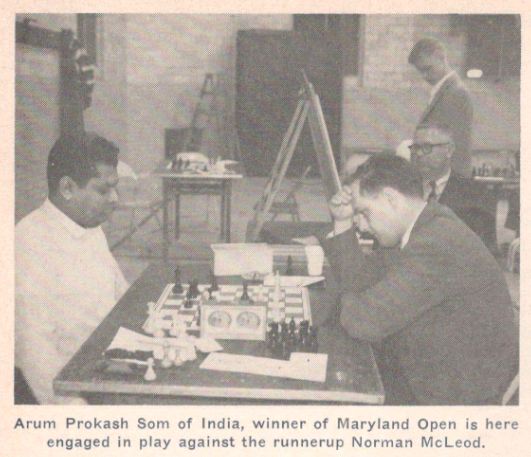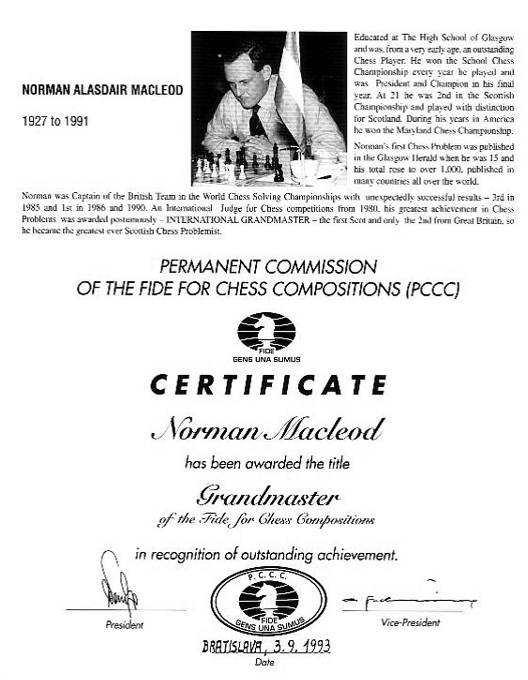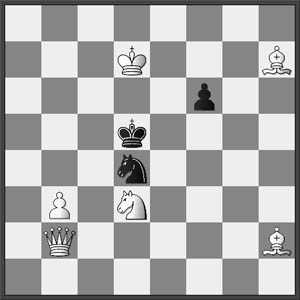
|
|
|
Norman Alasdair Macleod
Compiled by Alan McGowan
Born 06 December 1927, Glasgow - Died 02 October 1991, Ross-on Wye (BCM says Oct 3)
- International Judge of Chess Composition 1980
- International Master of Chess Composition 1984
- International Grandmaster of Chess Composition 1994
Norman Macleod studied at Glasgow High School and Glasgow University. He joined Glasgow Chess Club, and during his time there he met Comins Mansfield, the renowned problem composer, who encouraged Macleod's interest in chess problems. In the BCM 1980, page 283, Macleod commented that he had met Mansfield over the board, but had not realised he was a problemist until he, Macleod, obtained a copy of Brian Harley's book Mate in Two Moves and he "became hooked."
Macleod played in several Scottish championships, the earliest being 1951. In 1952 he was 2nd with 6/9, one point behind the winner, Dr Aitken. In 1953 he shared 2nd and 3rd places, and in 1957 he shared 2nd-4th places with 6½/8, on both occasions losing out to Dr Aitken. In 1959 he might have had his best chance of winning the event as the tournament was weakened through both Aitken and Fairhurst not being in the lineup. However, it was to be 2nd place again for Macleod with 4½ points, behind winner Peter Coast on 5.
In 1953 he took part in the Glasgow International Tournament. This was a strong event, which included Jonathan Penrose, Fairhurst, Golombek, Wade and Yanofsky etc. He scored 2½ points.
Shortly after this tournament Macleod, who was now working for the Foreign Office, moved to Washington D.C. for several years. During his time there he met his future wife, Daphne Maines.
During his service with the Foreign Office, MacLeod was based in Cheltenham, at GCHQ (Government Communications Headquarters). He was involved in chess locally, as was Dr Aitken, mentioned above, who worked at the same establishment. Macleod's duties took him back to the USA in the 1960s, and in 1964 he won the Maryland state championship.
The 1964 Maryland Open (USA)
Source: Chess Review 1964, p. 166.Arum Prokash Som, a staff member at the embassy of India, was the tournament winner with 5½/6, a half-point ahead of Macleod. However, the web site devoted to the history of chess in Maryland state, USA says:- 'Since MacLeod is from Maryland he should be the MD Champion.' A strange way to decide on a winner, considering that neither of them was from Maryland.
Munich Olympiad 1958
Macleod was a member of the Scottish team at the Munich 1958 Olympiad, playing on board 3 alongside Fairhurst, Dr Aitken, Perkins, Beckingham and Thomson. He scored 7/16, comprised of 3 wins, 8 draws and 5 losses. He showed no fear in his games, employing the King's Gambit twice, and using the Morra Gambit against the Sicilian Defence on several occasions, including the following effort against an International Master.
N.A. MacLeod - L. Sanchez (I.M. Columbia)
Munich Olympiad 1958 - Preliminaries, round 2.
1.e4 c5 2.d4 cxd4 3.c3 dxc3 4.Nxc3 Nc6 5.Nf3 a6 6.Bc4 e6 7.0-0 b5 8.Bb3 Bb7 9.Qe2 Nge7 10.Rd1 Ng6 11.Ng5 Be7 12.Bxe6 fxe6 13.Nxe6 dxe6 14.Rxd8+ Rxd8 15.Be3 0-0 16.Qg4 e5 17.Nd5 Bc8 18.Qh5 Bd6 19.h3 Nf4 20.Nxf4 exf4 21.Bb6 Be6 22.Bxd8 Nxd8 23.a4 Bf7 24.Qd1 Be5 25.axb5 axb5 26.Ra5 Bxb2 27.Rxb5 Ba3 ½-½N.A. MacLeod - F. Palmiotto (Italy)
Munich Olympiad 1958 - Final C, round 3.
1.e4 c5 2.Nf3 e6 3.d4 cxd4 4.c3 dxc3 5.Nxc3 a6 6.Bc4 b5 7.Bb3 Bb7 8.0-0 b4 9.Na4 Nf6 10.Be3 Nxe4 11.Nb6 Bc5 12.Bxc5 Nxc5 13.Nxa8 Bxa8 14.Qd4 Nxb3 15.Qxg7 Rf8 16.axb3 Bxf3 17.gxf3 h5 18.Rfe1 Qb6 19.Re5 Nc6 20.Rxh5 Nd4 21.Rh8 Rxh8 22.Qxh8+ Ke7 23.Qh4+ Ke8 24.Qe4 Nxb3 25.Rd1 a5 26.Qe3 Qxe3 27.fxe3 a4 28.Rd6 Nc5 29.Rd4 b3 30.Kf1 e5 31.Rc4 d6 32.Ke2 f5 33.Kd2 Kf7 34.Kc3 Kg6 35.Rb4 Kg5 36.Kc4 f4 37.e4 Kh4 38.Rb6 Ne6 39.Rxd6 Nd4 40.Rxd4 exd4 41.Kb4 Kh3 1-0
Chess Problems
Although Macleod was a strong over the board player, it was in the area of chess problems that he became best known, as pointed out clearly in the obituary below, written by Tom Russell, a friend who was also a problem enthusiast. Macleod was awarded the title of International Judge of Chess Composition in 1980, followed by the title of International Master of Chess Composition in 1984.
Norman Macleod died on the 2nd of October, 1991. In 1994 FIDE awarded him the title of International Grandmaster of Chess Composition.
OBITUARY
by Tom Russell
Reprinted from Scottish Chess No. 125, November 1991, page 21.
I recall walking into the Glasgow Chess Club one evening in the mid 1940s and noticing a new member even younger than myself. Norman and I were promptly introduced by the genial club secretary, Tom Greig. It was the beginning of a friendship which was to last over 45 years, ending only with Norman's untimely death from cancer.
Norman made rapid progress and within a few years won the Glasgow Chess Club championship. In 1953, after National Service in the army, he took part in the Glasgow international tournament, won by Penrose. In 1958 he played board 3 for Scotland behind Fairhurst and Aitken at the Munich Olympiad, performing creditably against strong opposition and defeating the Italian master Giustolisi among others. [Correction: he defeated the Italian Palmiotto - AMcG]
Norman played for Scotland against England in several friendly matches during the 50s and 60s, beating his man oftener than not. Winning the Scottish title was not to be: two finishes as runner-up, in one of which, Glasgow 1959, Norman was very unlucky not to win, were his best.
Norman's life time career in the Foreign Office required him to work in the USA for a time, during which he won the 1964 Maryland state championship. Norman was also good at five minute chess. It can be seen that he was a very strong player.
But it was in the field of the Chess Problem that Norman was truly outstanding. He was a strong solver, captain of the winning British World Championship team of 1986. Time was also found for much editing of problem departments in the Problemist and British Chess Magazine. Norman was also much involved in the exacting, time-consuming work of tourney judging. Some years ago he appraised 599 (!) three-movers for possible inclusion in the FIDE Album.
It was as a composer of the highest quality that Norman's name will live. He composed from the 1940s, winning many tourney honours, i.e. prizes, honourable mentions, commendations. My old friend's output slowed down for some years because he was helping his wife Daphne to bring up their children.
By the late seventies the Macleod family's two little girls were no longer, so that Norman was able to devote more time to the art of composition. Masterpieces poured forth. For at least the last dozen years of his life, Norman was beyond cavil Great Britain's finest composer and one of the best in the world, recipient of the title "International Master of Chess Composition" of the FIDE in 1984. Had he lived, the IGM of Chess Composition title would surely have been awarded also. [It was awarded, in 1994 - AMcG]
In the trienniel FIDE Albums, which record the cream of the world's Problems, many of Norman's best were included; in the latest, covering 1980-82, there were 19, more than any other Briton. Norman's art exhibited great originality, highly expert constructional technique, and a prolificness which enabled him to make up for the years in which his gifts lay fallow.
Look at the following amazing piece of work. In the old days, single mates only were allowed. Any choice of mate (duals, triples etc.) was considered a fault.
In Macleod's problem a triple mate is deliberately permitted after one Black Knight move.
Three other Knight moves are answered by intentional dual choices from the same three mates.
Three others are each answered by one of the other three.
Finally, the remaining Knight move cuts out all three mates and is answered by a fourth, different, mate.
This is Combinative Dual Separation, a theme so difficult that few composers can succeed in setting it.This superbly economical setting (nine pieces only), and many more of his creations, amply prove the genius of Norman Macleod.
Solution:
1.Bg1! The threat is 2.Qxd4 mate.
a) 1...Nb5 2.Nb4 (A), 2.Nf4 (B) and 2.Qg2 (C) mate.
b) 1...Nf3 2.Nb4 (A) and 2.Nf4 (B) mate.
c) 1...Ne6 2.Nb4 (A) and 2.Qg2 (C) mate.
d) 1...Nc6 2.Nf4 (B) and 2.Qg2 (C) mate.
e) 1...Ne2 2.Nb4 (A) mate.
f) 1...Nc2 2.Nf4 (B) mate.
g) 1...Nf5 2.Qg2 (C) mate.
h) 1...Nxb3 2.Qxb3 mate.
Sources:
BCM 1980, pages 282-286 - a tribute to Norman Macleod's problem composing.
Scottish Chess for November 1991.
BCM 1991, December.
John Glendinning, for providing a copy of the certificate for IGM of Chess Composition.
https://mdchess.com/index.php?option=com_content&view=article&id=457:list-of-maryland-open-and-amateur-champions&catid=35&Itemid=715
Other suggested reading:
http://de.wikipedia.org/wiki/Norman_Macleod
http://www.matplus.org.yu/MACLEOD.HTM
The Chessboard Adventures of Norman Macleod, Feenschach-Phenix 1997. Edited by John Rice.Alan McGowan
Archivist/Historian, Chess Scotlandupdated 14/5/2021



